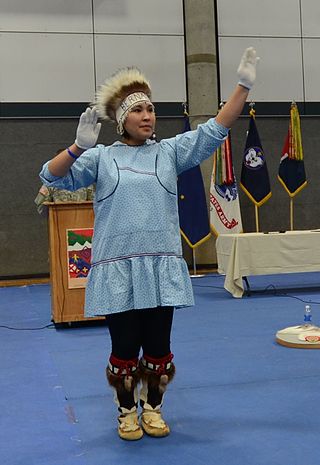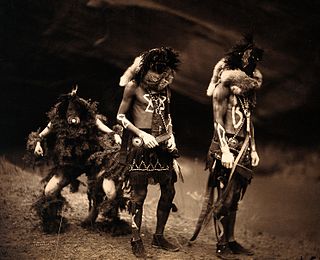Related Research Articles
Indian may refer to anything from or related to India, a country in Asia. Or, specifically:

A medicine man or medicine woman is a traditional healer and spiritual leader who serves a community of Indigenous people of the Americas. Individual cultures have their own names, in their respective languages, for spiritual healers and ceremonial leaders in their particular cultures.

Native Americans, also known as American Indians, First Americans, native Americans, and other terms, are the native peoples of the contiguous United States and Alaska. As defined by the United States Census, "Native Americans" are Indigenous tribes that are originally from the contiguous United States including Alaska Natives. There are 574 federally recognized tribes living within the U.S., about half of which are associated with Indian reservations. Indigenous peoples of Hawaii and territories of the United States are usually known by other terms. Indigenous peoples of the United States who are not listed as American Indian or Alaska Native include Native Hawaiians, Samoan Americans, and Chamorros. The US Census groups these peoples as "Native Hawaiian and other Pacific Islanders".
Multiracial people or mixed race people are people of more than one race. A variety of terms have been used both historically and presently for mixed race people in a variety of contexts, including multiethnic, polyethnic, occasionally bi-ethnic, Métis, Muwallad, Colored, Dougla, half-caste, ʻafakasi, mestizo, mutt, Melungeon, quadroon, octoroon, sambo/zambo, Eurasian, hapa, hāfu, Garifuna, pardo, and Gurans. A number of these terms are now considered offensive, in addition to those that were initially coined for pejorative use. Melezi (Мелези) are called the offspring of Muslim Romani men and woman of Host populations.

Alaska Natives are the indigenous peoples of Alaska and include Iñupiat, Yupik, Aleut, Eyak, Tlingit, Haida, Tsimshian, and a number of Northern Athabaskan cultures. They are often defined by their language groups. Many Alaska Natives are enrolled in federally recognized Alaska Native tribal entities, who in turn belong to 13 Alaska Native Regional Corporations, who administer land and financial claims.

An Indian reservation is an area of land held and governed by a U.S. federal government-recognized Native American tribal nation, whose government is semi-sovereign, subject to regulations passed by the United States Congress and administered by the United States Bureau of Indian Affairs, and not to the U.S. state government in which it is located. Some of the country's 574 federally recognized tribes govern more than one of the 326 Indian reservations in the United States, while some share reservations, and others have no reservation at all. Historical piecemeal land allocations under the Dawes Act facilitated sales to non–Native Americans, resulting in some reservations becoming severely fragmented, with pieces of tribal and privately held land being treated as separate enclaves. This jumble of private and public real estate creates significant administrative, political, and legal difficulties.

The Indigenous peoples of the Americas are the descendants of the inhabitants of the Americas who occupied the Western Hemisphere before arrival of European settlers in the 15th century.
The Native American name controversy is an ongoing discussion about the changing terminology used by the Indigenous peoples of the Americas to describe themselves, as well as how they prefer to be referred to by others. Preferred terms vary primarily by region and age. As Indigenous peoples and communities are diverse, there is no consensus on naming. Historically, until late in the 20th century, most Indigenous people in the Americas were collectively called "Indians". The distinct people in the Arctic were called "Eskimos". Both terms have declined in usage in formal speech.
Native Americans or Native American may refer to:
Black Indians are Native American people – defined as Native American due to being affiliated with Native American communities and being culturally Native American – who also have significant African American heritage.

The United States has a racially and ethnically diverse population. At the federal level, race and ethnicity have been categorized separately. The most recent United States census officially recognized seven racial categories, as well as people of two or more races. The Census Bureau also classified respondents as "Hispanic or Latino" or "Not Hispanic or Latino", identifying as an ethnicity, which comprises the largest minority group in the nation. The census also asked an "Ancestry Question," which covers the broader notion of ethnicity, in the 2000 census long form and the 2010 American Community Survey; the question worded differently on "origins" will return in the 2020 census.

In the United States, an American Indian tribe, Native American tribe, Alaska Native village, tribal nation, or similar concept is any extant or historical clan, tribe, band, nation, or other group or community of Native Americans in the United States. Modern forms of these entities are often associated with land or territory of an Indian reservation. "Federally recognized Indian tribe" is a legal term of art in United States law with a specific meaning.
Pacific Islander Americans are Americans who are of Pacific Islander ancestry. For its purposes, the United States census also counts Aboriginal Australians as part of this group.

Stereotypes of Indigenous peoples of Canada and the United States of America include many ethnic stereotypes found worldwide which include historical misrepresentations and the oversimplification of hundreds of Indigenous cultures. Negative stereotypes are associated with prejudice and discrimination that continue to affect the lives of Indigenous peoples.
In Navajo culture, a skin-walker is a type of harmful witch who has the ability to turn into, possess, or disguise themselves as an animal. The term is never used for healers.

Native American religions are the spiritual practices of the Native Americans in the United States. Ceremonial ways can vary widely and are based on the differing histories and beliefs of individual nations, tribes and bands. Early European explorers describe individual Native American tribes and even small bands as each having their own religious practices. Theology may be monotheistic, polytheistic, henotheistic, animistic, shamanistic, pantheistic or any combination thereof, among others. Traditional beliefs are usually passed down in the forms of oral histories, stories, allegories, and principles.
Multiracial Americans or mixed-race Americans are Americans who have mixed ancestry of two or more races. The term may also include Americans of mixed race ancestry who self-identify with just one group culturally and socially. In the 2010 United States census, approximately 9 million individuals or 3.2% of the population, self-identified as multiracial. There is evidence that an accounting by genetic ancestry would produce a higher number. The impact of historical racial caste systems, such as that created by admixture between white European colonists and Native Americans, has often led people to identify or be classified by only one ethnicity, generally that of the culture in which they were raised. Prior to the mid-20th century, many people hid their multiracial heritage because of racial discrimination against minorities. While many Americans may be considered multiracial, they often do not know it or do not identify so culturally, any more than they maintain all the differing traditions of a variety of national ancestries.

Slavery among Native Americans in the United States includes slavery by and slavery of Native Americans roughly within what is currently the United States of America.

Two-spirit is a modern, pan-Indian, umbrella term used by some Indigenous North Americans to describe Native people in their communities who fulfill a traditional third-gender ceremonial and social role in their cultures.

Indigenous peoples of California, commonly known as Indigenous Californians or Native Californians, are a diverse group of nations and peoples that are indigenous to the geographic area within the current boundaries of California before and after the colonization of Europeans. There are currently 109 federally recognized tribes in the state and over forty tribes or tribal bands that have applied for federal recognition. California has the second-largest Native American population in the United States.
References
- ↑ Facts On File, Incorporated (2010). Native American Mythology A to Z. Infobase Publishing. pp. 30–. ISBN 978-1-4381-3311-9.